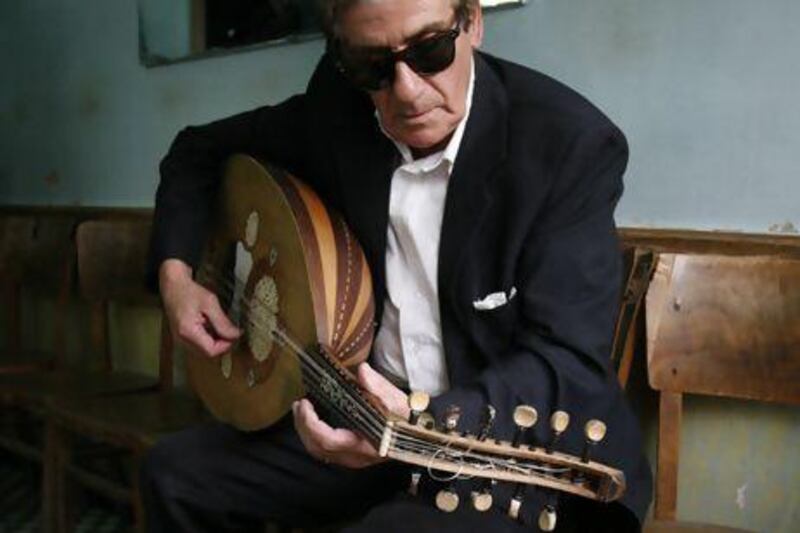LONDON // With his waves of white hair and frail body dressed neatly in a black suit, the 75-year old Rachid Berkani, ordering cheap pizza in a small London restaurant, seems an unlikely pop idol.
But two hours earlier, the singer and oud player drew hundreds of his fellow Algerians, and a few Brits, from their seats and into the aisles in London's Barbican concert hall. As the El Gusto Orchestra played, they danced with arms outstretched to songs of yearning for the home country.
"Oh, traveller, where are you going?" they sang along to the show's triumphant closing number, as the percussion thrummed and the ouds trilled. "Eventually you must come back."
Mr Berkani sat in the front row of the orchestra playing the oud at the concert last month, shoulder to crooked shoulder with other men in their seventies and older, playing the music they grew up with in the Arab quarter of Algiers when the city was still under fractious French rule.
"It doesn't stop at borders," he said afterward. "One can dance to it, the music is joie de vivre."
Mr Berkani and the elderly men who lead the touring group have known each other since before the birth of their country. But the bloody war of independence that began in 1954 scattered the musicians across the globe. Their reunion in London came as a result of happenstance - and the determination of one woman to see them reunited and playing together again.
In the 1950s, in shifting ensembles and solo shows, some members of the group had filled parties and cafes with a melange of Andalusian, Arab and African music that sprung up in Algeria a century ago. The style was known as Chaabi, the people's music.
When the war of independence began in 1958, the musicians, many of them studying in a conservatory under the master known as El Hajj Mohamed El Anka, were scattered.
Those of French origin, and many Jewish Algerians, fled to France. Others moved elsewhere as the Kasbah, the old city where they lived, became a battlefield. After the war, they built new lives. Some became music professors, some played at weddings, some were on television; others ran cafes or sold trinkets to tourists. Decades slipped by.
Then one day in 2003, an Irish-Algerian architect named Safinez Bousbia walked into Mohamed Ferkioui's shop in the Kasbah while on holiday and admired the mirrors he painted and sold. Already into his eighties, the wizened, twinkly Mr Ferkioui told her that he was once a band leader. He used to dance with his accordion like it was a woman, he said, showing her the Chaabi posters of his youth. He wondered where the other band members were.
Captivated by the tale, Ms Bousbia resolved to find them. It took two and a half years for her to track down 32 old musicians of the Kasbah - time enough to realise that she wanted to recreate their orchestra and document their stories on film.
"The youngest was 72 and the oldest was 98" when she found them, Ms Bousbia said. "The ones that accepted to join me were 26."
The film documents the Algiers contingent crossing to France to meet their old colleagues. The jubilant crew disembarks from the ferry - some with canes, some in wheelchairs - into the waiting arms of their old friends gathered in Marseilles.
"The key motif of this gathering is 'do you remember, do you remember'," says one, as the men embrace.
Remembrance, along with nostalgia and exile, have become more prominent themes of Chaabi music in the years since the war. When the men first studied the genre, long, ancient Arabic poems were often set to the music, recalled Abdelkader Chercham, 67, a singer and oud player .
But now when they play, usually outside Algeria because of the difficulty of getting visas for the long-exiled members, they sing love songs to their country, often couched in the feelings of long estrangement familiar to the millions of Algerians who have left their stalling nation in hope of a better life.
"There is nostalgia, emotion, sadness, all this is in El Gusto," said Mr Chercham. "Even if you don't understand the words, it is conveyed by the music."
The group played last month in Fez in Morocco, and in Paris. Despite advancing age, and even the deaths of some of the members since they started out, they are planning a third European tour.
Younger members play, too, but centre stage is reserved for their elders. Mr Ferkioui leapt to his feet at the London concert. Thin and wrinkled in thick glasses and a woollen hat, he looked fragile - until he began to dance. Snaking his hips, shaking his shoulders, he laughed at those in the audience still seated.
"My mum grew up in the Kasbah. She knew these guys," said Lila Sahraoui, 40, a housewife who now lives in London's suburbs. "It's very emotional because they sing folk music and it's about love."
Her friend, Feryel Fraoucene, 38, joined her. "A lot of the songs are about the early migrants," she said, "and it's very kind of naively romantic.
"We love it because our mothers love it, and we are abroad and far from our families."





